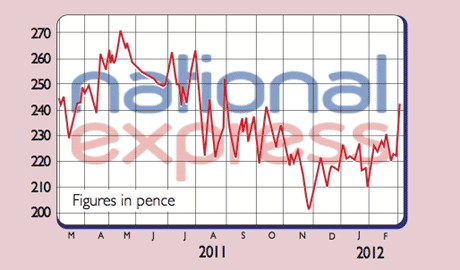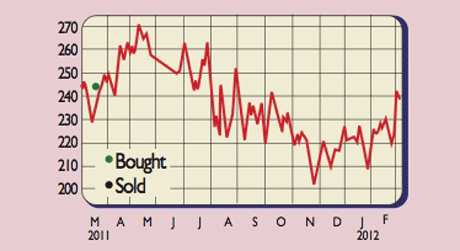Shares in focus: A steady route to profits
National Express suffered a loss of face when it was forced to hand back the East Coast rail franchise. Has the transport operator bounced back? And should you buy the shares? Phil Oakley investigates.
Get the latest financial news, insights and expert analysis from our award-winning MoneyWeek team, to help you understand what really matters when it comes to your finances.
You are now subscribed
Your newsletter sign-up was successful
Want to add more newsletters?

Twice daily
MoneyWeek
Get the latest financial news, insights and expert analysis from our award-winning MoneyWeek team, to help you understand what really matters when it comes to your finances.

Four times a week
Look After My Bills
Sign up to our free money-saving newsletter, filled with the latest news and expert advice to help you find the best tips and deals for managing your bills. Start saving today!
The business
National Express is the largest coach operator in Britain, serving more than 1,000 destinations, including major cities and airports. It is also the UK partner in the Eurolines coach network. The British bus business is concentrated in the West Midlands, the biggest bus market in Britain other than London. It also runs the Midlands Metro light rail system and buses in Dundee.
In Britain it operates the C2C commuter franchise between South Essex and London. Alsa, the group's Spanish business, operates long-distance and regional coach services and urban bus services in Spain and Morocco. National Express is also the second-biggest private provider of school bus services in North America.
The history
The firm was formed in 1988 via a management buy-out of the long-distance coach services of the National Bus Company. In 1995, it established itself as a major player in the bus market with the purchase of West Midlands Travel. In 1996 it acquired its first privatised rail franchises.
MoneyWeek
Subscribe to MoneyWeek today and get your first six magazine issues absolutely FREE

Sign up to Money Morning
Don't miss the latest investment and personal finances news, market analysis, plus money-saving tips with our free twice-daily newsletter
Don't miss the latest investment and personal finances news, market analysis, plus money-saving tips with our free twice-daily newsletter
The purchase of Durham Transportation in 1998 marked the beginning of large investments in the North American school bus sector. In 2000, National Express became Britain's biggest train operator when it bought Prism Rail. The early 2000s saw the firm make steady progress, but the second half of the decade brought big problems.
Big acquisitions in the Spanish bus market saw debt soar to £910m in 2008. However, the decision to pay too much money to run the East Coast rail franchise proved to be disastrous. A recession saw rail profits collapse and dividends disappear entirely. The company had to hand back the East Coast franchise to the government and suffered huge damage to its reputation. A £360m rights issue in 2009 and a turnaround plan under chief executive Dean Finch has put the company on a more stable footing.
The chief executive
Dean Finch has been chief executive since 2010. He has an impressive background in public transport. Initially a chartered accountant, he then worked on consultancy projects including British rail privatisation in the mid-1990s. He had an extensive career at First Group, running the group's British rail business before becoming North American and group chief operating officer.
Prior to joining National Express, he was CEO of Tube Lines, a company responsible for maintaining and upgrading large parts of the London Underground. He was paid £1.3m in 2010.
Why you should buy the shares
The group's turnaround plan should continue to deliver results. We see scope for more improvements in profit margins and cash flow. More importantly, National Express has businesses that look set to benefit as consumers, and local and state governments, are increasingly strapped for cash.
For example, rail tickets are becoming expensive in Britain. Coach travel offers a cheaper alternative. In North America, school boards face increasing pressure to balance budgets. Outsourcing school bus provision can save them money. With only a third of the school bus market in private hands, National Express is exposed to a long-term growth market.
In Spain, low-cost airlines are taking capacity out while public funding for rail has gone down. This looks favourable for the group's long-distance coach businesses. Bus businesses tend to have much more stable profits than most rail franchises. They also generate lots of cash.
The medium-term outlook for National Express's cash flow looks promising. With a dividend yield of more than 4%, the shares are a buy'.
The numbers

Stockmarket code: NEX
Share price: 237p
Market cap: £1.2bn
Net assets (Dec 2011): £965m
Net debt (Dec 2011): £633m
P/e (current year estimate): 9.6 times
Yield (prospective): 4.2%
What the analysts say
Buy 11
Hold 8
Sell 1
Average price target 269p
Director shareholding

D Finch: 68,275
J Maiden: 116,347
J Devaney 76,666
J Cosmen 88,860,685
Get the latest financial news, insights and expert analysis from our award-winning MoneyWeek team, to help you understand what really matters when it comes to your finances.
Phil spent 13 years as an investment analyst for both stockbroking and fund management companies.
-
 Early signs of the AI apocalypse?
Early signs of the AI apocalypse?Uncertainty is rife as investors question what the impact of AI will be.
-
 Reach for the stars to boost Britain's space industry
Reach for the stars to boost Britain's space industryopinion We can’t afford to neglect Britain's space industry. Unfortunately, the government is taking completely the wrong approach, says Matthew Lynn